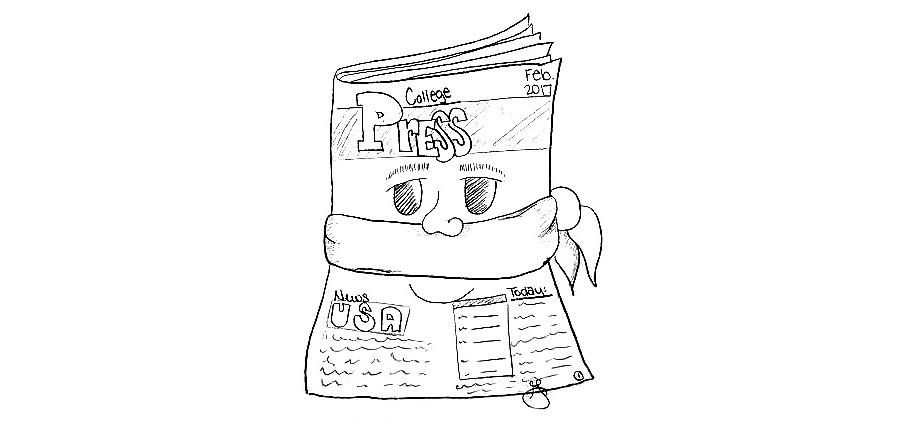Cartoon by Gabbie Evans
JENNA VORIS | OPINION COLUMNIST | jmvoris1@butler.edu
My name is Jenna, and I love long walks on the beach, dogs that trip over their own ears and the First Amendment.
That was my Tinder biography for the week leading up to Valentine’s Day, typed out with a desperate hope that maybe someone with an equal passion for clumsy canines and freedom of the press would hit me up.
That’s exactly what happened – sort of.
The Indiana Collegiate Press Association sent out a mass email about a new bill being heard on Feb. 14 by the Indiana General Assembly. While I don’t know the ICPA’s stance on dogs, they do have a commitment to developing a free and responsible press corps among collegiate students.
It was almost as if they had swiped right.
So, with no other potential suitor in sight, I traded my Valentine’s Day brunch for a date with the statehouse and ditched my pale pink skirt in favor of a blue and red Be Heard t-shirt.
The bill in question was House Bill 1130. Not only did it provide protections for student journalists, it required that public schools K-12 could not suppress or censor any student media unless it was false, libelous or slanderous.
Just like any Tinder date, this hearing dragged on for hours before anything exciting happened. By the time the education committee announced they were ready to open the floor to testimonies for Bill 1130, I was focusing less on my love of the First Amendment and more on my love for the $2 tacos at Scotty’s Dawghouse.
Student journalists from across the state gathered to support the bill and some spoke to the committee. As a journalist and someone who attended public school, I was interested to hear about experiences with censorship in their schools.
Carmel High School senior Selena Qian spoke in support of the bill, though she said she has never experienced censorship at her school’s publication.
“Freedom of press really shouldn’t be a matter of luck,” she said. “It should be written into law with this bill because student publications should always be the work and responsibilities of the students.”
While I did not stay for the entire hearing, it became obvious that, from the students I heard from, there was not a person among them who had experienced the level of censorship that would require a bill passing through the Indiana General Assembly.
If this had been a real Valentine’s Day Tinder date, I would probably have bailed after the first speaker, offering a semi-believable excuse about how I needed to pick up my roommate or forgot that I had cookies in the oven.
But I wasn’t on a date. I was sitting in a high backed, leather chair, in House Chambers, listening to students talk about something that they had never experienced.
Don’t get me wrong: I think the bill is necessary. I think having honest and open discussions about the freedom of the press — especially now when it seems like so many journalists are insulted and blacklisted for simply telling the truth — is important.
The hearing that was conducted, however, made the issue seem like neither one of those things.
I wanted to hear from a student who had a story pulled because it was too controversial.
Instead, the students that I heard echoed the same sentiment: this has never personally happened to me, but I know it happens in other places.
It felt like when men try to talk about women’s rights, or white people think they can have an accurate and constructive conversation about racism because they have a black friend. While engaging and interesting testimony, it would have been better coming from those who have had their work censored.
These students meant well but they and the education committee seemed to forget that those who spoke were able to do so because of privilege.
Students who do have their work blocked from newspapers don’t go to schools that care about journalism. They don’t have advisors who will coach them on ethics and rights and techniques. They probably didn’t even know that there was a hearing on a bill today.
Those are the new voices that the education committee should be listening to and considering. With the testimony of their more privileged peers in hand, the members of the Indiana General Assembly have a responsibility to question and dig and push to find those who haven’t been able or allowed to speak before today.
While my Valentine’s Day date with the State House wasn’t quite what I thought it would be, I found myself enjoying the inside look into our government enough to swipe right on the next hearing that comes my way.
